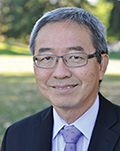Bill Maher Can Do Better: We Need Real Talk About Vaccines

Kyle Yasuda, MD, FAAP
November 8, 2019
One week ago today, an episode of "Real Time with Bill Maher" opened with an interview that included disproved theories and unfounded fears about vaccines. Ordinarily, I would not feel compelled to blog about a 10-minute Bill Maher interview and I don’t watch the show. But these are not ordinary times. Misinformation is repeated and amplified rapidly across platforms like Facebook and Twitter, and we knew about Mr. Maher’s comments almost immediately. Nowadays, the reach of misinformation goes beyond any particular TV program or website or individuals who hear it or see it firsthand. This dangerous echo chamber is leading to an increase in vaccine hesitancy and contributing to a resurgence of vaccine-preventable illness. I can’t let this one go unanswered.
Having a platform and a microphone does not make you an expert, but it does make you influential. How you talk matters, especially now when so much of our public discourse is distilled into sound bites and hashtags. It’s not just harmless entertainment when the takeaway message encourages people to question vaccines. Normalizing misinformation is dangerous.
It’s true that parents have questions about vaccines – and pediatricians answer them, every day, when they meet with families to talk about their children’s health. What’s disappointing and alarming about Mr. Maher’s segment, which chose to interview a pediatrician who is a known vaccine skeptic, is that it focused so heavily on long debunked myths about vaccines. This was not a dialogue to further understanding. This was not even a chance for Mr. Maher to ask an expert his own questions about vaccines’ safety and efficacy. The reason most media outlets no longer share the false claims Mr. Maher promoted on his show is because they damage public health, and do nothing to further public understanding.
It’s my goal as AAP President to equip parents with all the information they need to make good decisions about their children’s health. That’s why earlier this year, I reached out to social media companies to compel them to do more to combat the rampant spread of misinformation online. We’ve made some progress there, though we still have a long way to go.
As we approach cold and flu season, as measles outbreaks continue to threaten public health, and as we learn even more about the devastating impact of the measles virus on healthy immune systems, it is more important than ever to elevate science and promote understanding about vaccines. Mr. Maher’s show did not do that, and it’s a shame.
“Having a platform does not make you an expert, but it does make you influential. Pediatricians are ready to share the science and facts about immunizations, exactly how they work and what we know about their side effects, efficacy, and safety.”
There is too much at stake right now not to speak out when people in positions of power and influence spread misinformation, even when couched in humor, even when contained in a 10-minute conversation on a late-night television show. Being from Washington state, the origin of one of our nation’s recent measles outbreaks, I fear for the health and safety of children and families in my community who are at increased risk of contracting a vaccine preventable disease, especially those too young or too sick to be immunized. But what I am coming to fear more and more is the spread of misinformation that influences people’s decision not to vaccinate in the first place.
It’s ok to have questions about vaccines. Pediatricians are ready to share the science and facts about immunizations, exactly how they work, and what we know about their side effects, efficacy, and safety. We encourage Mr. Maher to consider our offer to provide a science-informed perspective to a future episode.
Thinking outside of the box is one thing, thinking outside of the facts is another.
*The views expressed in this article are those of the author, and not necessarily those of the American Academy of Pediatrics.
About the Author
Kyle Yasuda, MD, FAAP
Kyle Yasuda, MD, FAAP, is president of the American Academy of Pediatrics.